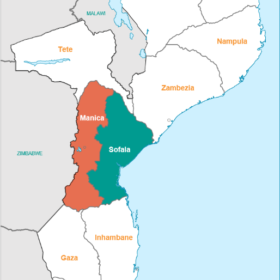World Education to Support Implementation of New Locally Led Projects in Mozambique
 World Education’s Bantwana Initiative will strengthen the capacity of local organizations to coordinate and provide services for vulnerable families
World Education’s Bantwana Initiative will strengthen the capacity of local organizations to coordinate and provide services for vulnerable families
World Education is pleased to announce the award of two new USAID-funded projects that will reduce HIV among vulnerable children, youth and their families in high burden areas in central Mozambique. World Education’s Bantwana Initiative will serve as a capacity building provider to both projects’ consortia of Mozambican community-based and faith-based partner organizations with successful track records of HIV service delivery.
Over the past five years (2015-2020) through the USAID Força à Comunidade e Crianças project, World Education’s Bantwana Initiative has partnered with local organizations, fostering their technical and financial capacity for high-quality, cost-effective service delivery. In line with USAID’s and PEPFAR’s localization goals, local partner organizations will now lead the new projects with capacity building from World Education’s Bantwana Initiative to assist them on their journey to self-reliance.
The two five-year projects (2020-2025) will scale up evidence-based and innovative strategies for HIV and gender-based violence prevention and response aligned with the Government of Mozambique’s response to the HIV epidemic. ANDA, a local NGO, will lead the Chengetai Vana (Look After Children) project in seven districts across Manica Province, and local NGO, ComuSanas, will manage the MwanaSana (Healthy Child) project in five districts of Sofala Province. World Education’s Bantwana Initiative will provide customized capacity building for the first three years of the projects (2020-2023) to ensure effective program implementation and management for the new direct recipients of USAID/PEPFAR funds, as well as short-term technical assistance to support integrated health and social protection service delivery for vulnerable families.
The projects will implement at the individual, family, community and systems level to provide a comprehensive package of health, education, economic and child protection interventions tailored to at-risk groups. Through a targeted case management approach, the projects will identify vulnerable children and adolescents, link them to HIV testing and continuum of care services, and support their retention in treatment. The projects will also engage and mobilize communities and improve coordination among health and social protection systems, while also building the capacity of local partners for sustainability.
